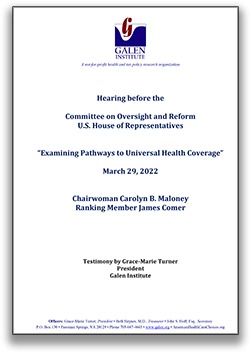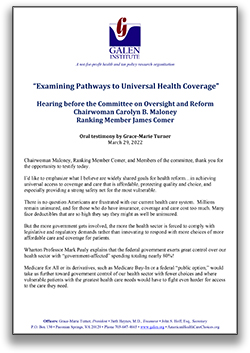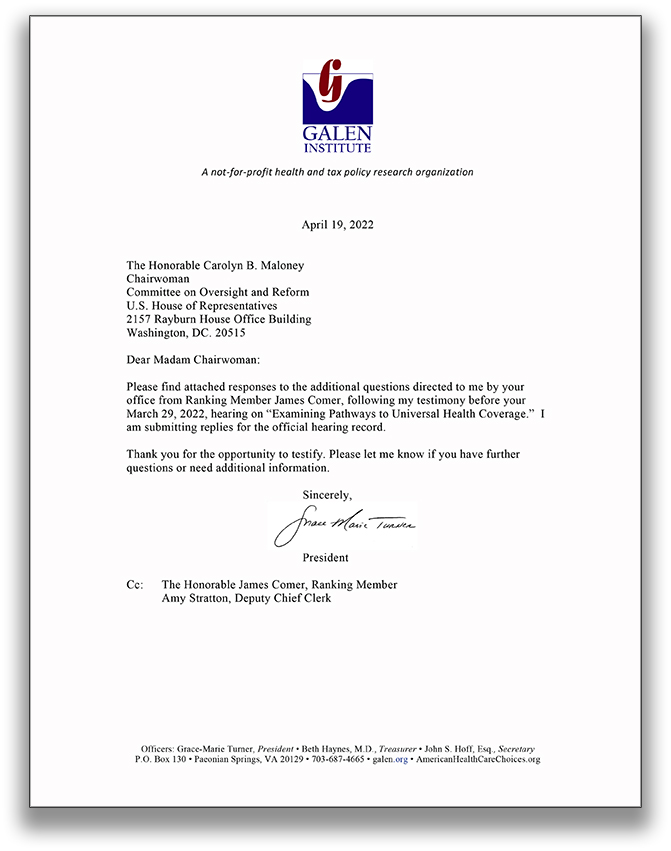In a marathon five-hour hearing on Tuesday, Democrats who control the House Oversight and Reform Committee painted a wildly unrealistic picture of the utopia of a single, government-controlled health care system they call Medicare for All.
“Everyone could go to see any doctor or hospital anytime without worrying about cost,” Rep. Jamaal Bowman (D-NY) proclaimed.
“Right here, I can walk in and be seen on the spot” at Congress’ Office of Attending Physician (OAP). The full service medical facility is just a “10-minute walk with unlimited access and follow-up,” Rep. Bowman said, adding that everyone should have this.
Indeed. We should all be able to walk down the hall and see physicians just waiting for us to show up, with no charge or insurance card.
Members of Congress, who get their health insurance through a program specially designed for them through Obamacare, can also walk from their offices to receive medical care at the OAP anytime. Members of Congress pay a flat, annual fee of about $500 for all the care they receive there (financed by federal taxpayers in the U.S. Navy budget).
That is Rep. Bowman’s vision of Medicare for All. Other Members echoed similar idealistic visions where people could see any doctor they want or visit any hospital any time for all the “medically necessary” care they need or want. There was no acknowledgement whatsoever of resource constraints.
We heard over and over how absolutely horrible the U.S. health system is—irredeemably broken, with the highest costs in the world and by far the worst outcomes. The only solution, we heard again and again, is to chuck the whole thing and start over.
To their credit, 13 Republican members of the committee attended the hearing to ask their five minutes of questions and strongly push back.
“You say people are being harmed by the current system,” asked Rep. James Comer of Kentucky, the Ranking Republican on the committee. “It’s your system! This is what you have created!”
He’s right: Government directly controls more than half of all health spending in the U.S., and indirectly controls much of the rest.
Rep. Fred Keller, R-PA, recounted a powerful story about his son, who was on life support after experiencing a traumatic brain injury in 1994 that doctors said would be 100% fatal.
His son recovered and is a thriving adult. Rep. Keller attributed his survival to his family having control over his son’s care, in contrast to parents in the UK. Here’s the video clip.
As I reported last week, I was the only expert witness Republicans were allowed to call. I cited abundant evidence that pouring more taxpayer money into our health sector and that burying it in more and more rules and regulation can never be the solution. The vulnerable will be harmed the most.
A few of my key points:
- Seniors on Medicare, employees with insurance through their jobs, and everyone else would lose the coverage they have now to be forced onto the new government program where everyone would have the same standardized care, as Rep. Peter Welch (D-VT) reminded us—standardized care designed by Washington bureaucrats and politicians, not by choices in a competitive insurance market catering to patients’ needs and preferences.
- Nearly all Americans have access to health coverage, either through private plans or public programs; if they are uninsured, it’s because they haven’t signed up. We need targeted solutions to address those who are still uninsured and do a much better job than we are now of focusing on the most vulnerable.
- With all of the waste in government spending, such as $100 billion a year in improper payments in Medicaid alone, how on earth do they think a government-run program will be less expensive?
- Three states that have tried to launch their own single-payer health systems have failed miserably—Vermont, Colorado, and most recently California.
- Where would all of the M-4-All cost savings come from? By paying much less to doctors, hospitals, drug companies, and everyone else providing goods and services in the health sector. Democrats also envision huge administrative cost savings in a government-run program—a point that is debunked by pure logic and observation, but also deep-dive studies.
Thanks, everybody, who wrote me notes to cheer me on before and after my testimony. I was in the witness chair—live in the hearing room in the Rayburn House Office Building—for more than four hours. Every Republican witness asked questions of just me, and all were informed and courteous.
The only member who was off-the-charts wrong and rude was Rep. Hank Johnson, D-GA, who is not known for the accuracy of his questioning.
Here is a link to the YouTube video of the full hearing: “Examining Pathways to Universal Health Coverage.”



